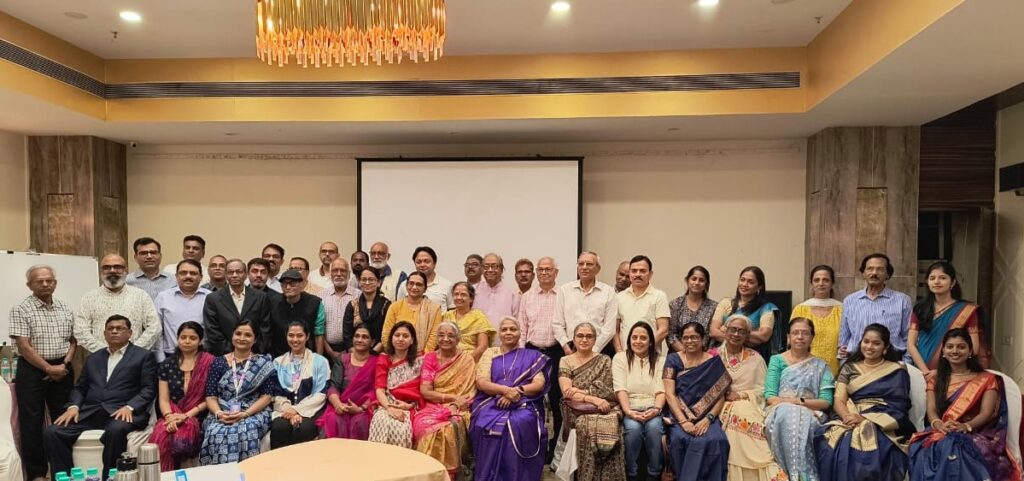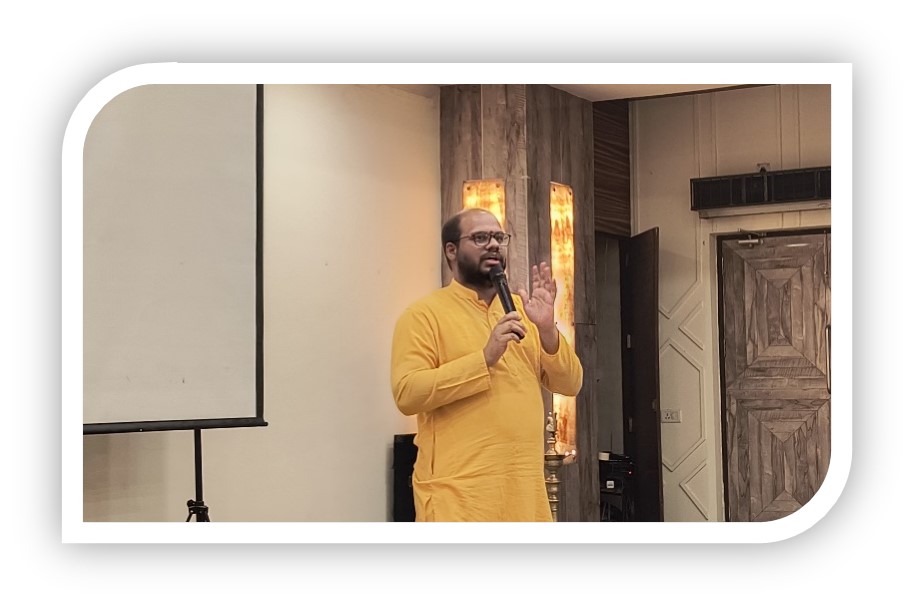Happy Ageing for Peace & Happiness(1/2)

We conducted a client meeting on “Happy Aging for Peace & Happiness” on 18th January 2025 at CBD Belapur, which was addressed by two eminent speakers. All the clients who attended the meeting have either achieved or are nearing Financial Freedom.
Session 1: Happy Ageing for Peace & Happiness :

Self-Unfoldment: The first book authored by Swami Chinmayananda
Presented by Brahmachari Samartha Chetan from Chinmaya Mission spoke on the practical guide for peace and happiness in life, offering insights into the nature of the self, the path of self-realisation, and how to live a meaningful and spiritually fulfilling life while engaging with the world. The book encourages readers to transcend the limitations of the ego and discover their true, divine nature through knowledge, practice, and inner transformation. Chinmayananda encourages living in harmony with one’s deeper values, which can help retirees find fulfillment in this phase of life. By focusing on spiritual goals and contributing to the community or family, retirees can continue to live a purposeful life.
Happiness is the ultimate goal for all beings, not just humans. In everything we pursue, whether it’s financial advice, material possessions, or achievements. The core motivation is happiness. We seek financial advice, for example, not for the sake of money itself but to ensure we have enough to fulfil our needs and desires, which ultimately lead to happiness.
Imagine someone offering you to fulfil all your wishes; anything you want, money, possessions, power, or people, but with one condition: you cannot enjoy any of it. Would anyone accept that? The answer is No. This is because at the heart of all our pursuits lies the quest for joy and contentment. Success or failure doesn’t define joy; joy is simply a state of mind, a feeling of deep enjoyment that transcends external circumstances.
Everything in life, whether it’s a possession, a relationship, or an accomplishment, is temporary. For example, money is not permanent, and neither is our body. So, if we rely on temporary things to give us joy, that joy won’t last. True, lasting happiness must come from something permanent.
The goal of life isn’t just to achieve material things or goals like getting a degree or a job. What we are truly after is happiness. But since everything in the world has a beginning and an end, it can’t give us lasting happiness. For example, the universe itself had a beginning, and one day, it will end.
The only permanent thing in our existence is the “self”, the consciousness or awareness behind our thoughts, body, and mind. This “self” doesn’t change, no matter what our body or mind does. This is where permanent happiness can come from. The challenge is to recognize that your true self is beyond the body, mind, and intellect. We often identify ourselves with these things, but they are not “who we are.”
Spirituality is the path that helps us realize that we are not limited to our body or mind. It teaches us to understand our deeper existence and find joy from within. Through knowledge and practice, we can experience permanent happiness. The process requires both understanding (knowledge) and action (practice). One without the other won’t lead to transformation.
Dependency arises from identifying with the body, but the true self exists beyond it. The body has needs, but the “I” remains independent, like a user of an instrument. Attachment stems from this mistaken identity, creating restlessness and the illusion that external things bring happiness. True joy emerges when the mind is quiet, and self-unfoldment is about realizing, not creating—this inner peace.
Happiness comes from within, not from external objects. If objects contained happiness, they would bring the same joy to everyone in all situations. True joy arises when the mind is quiet, allowing our inner peace to surface. Self-unfoldment is about experiencing this inner happiness while engaging in life’s duties. Financial freedom often leads people to seek deeper meaning, prompting retirement and a spiritual journey toward self-contentment.
Life follows a natural progression: first, we learn (Brahmacharya), then we earn (Grihastha) through righteous means. After achieving financial freedom, we turn (Vanaprastha) towards deeper pursuits, seeking lasting happiness. Finally, in Sannyasa, we dedicate ourselves fully to a higher cause—be it social, national, or spiritual—without returning to material concerns. True fulfillment comes from transcending personal needs and dedicating oneself to a greater purpose.
Life’s journey moves beyond personal and family concerns toward a selfless purpose. After achieving financial freedom, true fulfillment comes from serving the greater good—social, economic, national, or spiritual. Self-realization means recognizing our unity with all, where happiness arises from contribution rather than personal gain.
True freedom is a state of thoughtless awareness, where joy is independent of external factors. Moksha, as understood here, is the end of sorrow and the attainment of ultimate happiness, though different traditions define it uniquely. With abundant resources available, individuals can explore and follow the path that resonates with them.
Understanding that existence itself is happiness does not eliminate passion or drive for work. Intellectually accepting this idea is different from truly experiencing it. A young person who realizes this will still seek guidance from mentors or spiritual teachers to understand how to apply this knowledge in life. Duties and responsibilities must still be fulfilled, and contributing to the world remains essential. Even those on a spiritual path continue to work, serve, and participate in worldly transactions, as some form of exchange is inevitable in life.
Fulfilling one’s duty is essential in spirituality and does not mean giving up ambition. True progress comes when individuals are inspired by a higher purpose beyond personal ambition. Selfless efforts for societal growth drive real advancement, rather than pure individual pursuits.
Spirituality is not about renouncing responsibilities but balancing worldly duties with detachment. One can pursue higher aspirations while contributing to society. While the traditional path follows a phased approach—study, work, family, and then spiritual pursuit—direct renunciation is possible if one is ready. True growth comes from shifting the mindset, not abandoning life, but allowing both personal fulfilment and spiritual growth.
To be continued for session 2…
six comments
Interesting read
Good one
Great & interesting read!
Great insights into peace , happiness and process of getting to oneself .
Wonderful
Very inspirational